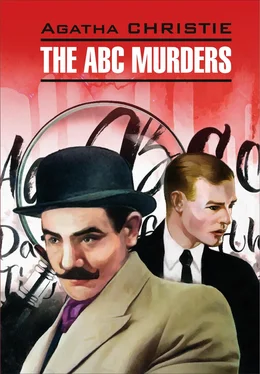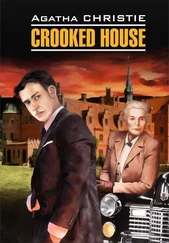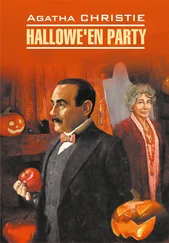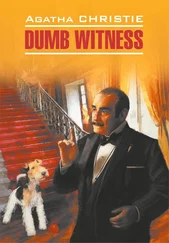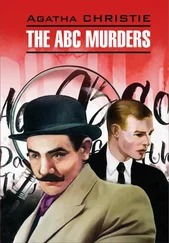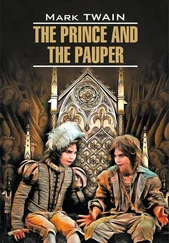Poirot smiled but did not answer.
The conference broke up.
‘Well,’ said the Assistant Commissioner. ‘As you say, Crome, pulling him in is only a matter of time.’
‘We’d have had him before now,’ said the inspector, ‘if he wasn’t so ordinary-looking. We’ve worried enough perfectly inoffensive citizens as it is.’
‘I wonder where he is at this minute,’ said the Assistant Commissioner.
Chapter 30
(Not from Captain Hastings’ Personal Narrative)
Mr Cust stood by a greengrocer’s shop.
He stared across the road.
Yes, that was it.
Mrs Ascher. Newsagent and Tobacconist…
In the empty window was a sign.
To Let.
Empty…
Lifeless…
‘Excuse me, sir.’
The greengrocer’s wife, trying to get at some lemons.
He apologized, moved to one side.
Slowly he shuffled away—back towards the main street of the town…
It was difficult—very difficult—now that he hadn’t any money left…
Not having had anything to eat all day made one feel very queer and light-headed…
He looked at a poster outside a newsagent’s shop.
The A B C Case. Murderer Still at Large. Interviews with M. Hercule Poirot.
Mr Cust said to himself:
‘Hercule Poirot. I wonder if he knows…’
He walked on again.
It wouldn’t do to stand staring at that poster…
He thought:
‘I can’t go on much longer…’
Foot in front of foot… what an odd thing walking was…
Foot in front of foot—ridiculous.
Highly ridiculous…
But man was a ridiculous animal anyway…
And he, Alexander Bonaparte Cust, was particularly ridiculous.
He had always been…
People had always laughed at him…
He couldn’t blame them…
Where was he going? He didn’t know. He’d come to the end. He no longer looked anywhere but at his feet.
Foot in front of foot.
He looked up. Lights in front of him. And letters…
Police Station.
‘That’s funny,’ said Mr Cust. He gave a little giggle.
Then he stepped inside. Suddenly, as he did so, he swayed and fell forward.
Chapter 31
Hercule Poirot Asks Questions
It was a clear November day. Dr Thompson and Chief Inspector Japp had come round to acquaint Poirot with the result of the police court proceedings in the case of Rex v. Alexander Bonaparte Cust.
Poirot himself had had a slight bronchial chill which had prevented his attending. Fortunately he had not insisted on having my company.
‘Committed for trial [285] to commit for trial – передать обвиняемого суду
,’ said Japp. ‘So that’s that.’
‘Isn’t it unusual?’ I asked, ‘for a defence to be offered at this stage? I thought prisoners always reserved their defence [286] to reserve defence – сохранять за собой право на защиту
.’
‘It’s the usual course,’ said Japp. ‘I suppose young Lucas thought he might rush it through [287] to rush (smth.) through – быстро провести ( дело )
. He’s a trier, I will say. Insanity’s the only defence possible.’
Poirot shrugged his shoulders.
‘With insanity there can be no acquittal. Imprisonment during His Majesty’s pleasure is hardly preferable to death.’
‘I suppose Lucas thought there was a chance,’ said Japp. ‘With a first-class alibi for the Bexhill murder, the whole case might be weakened. I don’t think he realized how strong our case is. Anyway, Lucas goes in for originality. He’s a young man, and he wants to hit the public eye.’
Poirot turned to Thompson.
‘What’s your opinion, doctor?’
‘Of Cust? Upon my soul [288] Upon my soul – Честное слово
, I don’t know what to say. He’s playing the sane man remarkably well. He’s an epileptic, of course.’
‘What an amazing dénouement that was,’ I said.
‘His falling into the Andover police station in a fit? Yes—it was a fitting dramatic curtain to the drama. ABC has always timed his effects well.’
‘Is it possible to commit a crime and be unaware of it?’ I asked. ‘His denials seem to have a ring of truth in them.’
Dr Thompson smiled a little.
‘You mustn’t be taken in by that theatrical “I swear by God” pose. It’s my opinion that Cust knows perfectly well he committed the murders.’
‘When they’re as fervent as that they usually do,’ said Crome.
‘As to your question,’ went on Thompson, ‘it’s perfectly possible for an epileptic subject in a state of somnambulism to commit an action and be entirely unaware of having done so. But it is the general opinion that such an action must “not be contrary to the will of the person in the waking state”.’
He went on discussing the matter, speaking of grand mal and petit mal [289] grand mal and petit mal (фр.; мед.) – тяжелая и легкая формы эпилептического припадка
and, to tell the truth, confusing me hopelessly as is often the case when a learned person holds forth [290] to hold forth – разглагольствовать
on his own subject.
‘However, I’m against the theory that Cust committed these crimes without knowing he’d done them. You might put that theory forward if it weren’t for the letters. The letters knock the theory on the head [291] to knock smth. on the head – покончить с чем-либо
. They show premeditation and a careful planning of the crime.’
‘And of the letters we have still no explanation,’ said Poirot.
‘That interests you?’
‘Naturally—since they were written to me. And on the subject of the letters Cust is persistently dumb. Until I get at the reason for those letters being written to me, I shall not feel that the case is solved.’
‘Yes—I can understand that from your point of view. There doesn’t seem to be any reason to believe that the man ever came up against [292] to come up against – выступать против
you in any way?’
‘None whatever.’
‘I might make a suggestion. Your name!’
‘My name?’
‘Yes. Cust is saddled—apparently by the whim of his mother (Oedipus complex [293] Oedipus complex – Эдипов комплекс, бессознательное или сознательное сексуальное влечение к родителю противоположного пола
there, I shouldn’t wonder!)—with two extremely bombastic Christian names: Alexander and Bonaparte. You see the implications? Alexander—the popularly supposed undefeatable who sighed for more worlds to conquer. Bonaparte—the great Emperor of the French. He wants an adversary—an adversary, one might say, in his class. Well—there you are—Hercules the strong.’
‘Your words are very suggestive, doctor. They foster ideas…’
‘Oh, it’s only a suggestion. Well, I must be off.’
Dr Thompson went out. Japp remained.
‘Does this alibi worry you?’ Poirot asked.
‘It does a little,’ admitted the inspector. ‘Mind you, I don’t believe in it, because I know it isn’t true. But it is going to be the deuce to break it. This man Strange is a tough character.’
‘Describe him to me.’
‘He’s a man of forty. A tough, confident, self-opinionated mining engineer. It’s my opinion that it was he who insisted on his evidence being taken now. He wants to get off to Chile. He hoped the thing might be settled out of hand [294] out of hand – быстро
.’
Читать дальше
Конец ознакомительного отрывка
Купить книгу
